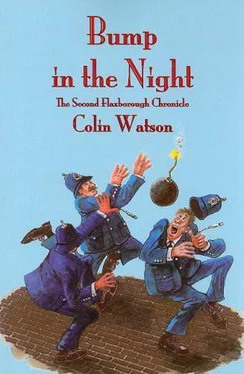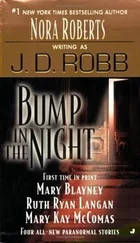Spotting them, he nodded curtly. “They told me I’d find you in here.”
Purbright marvelled once again at the omniscient ‘they’ without whom, it seemed, all channels of information in Chalmsbury would dry up. To Pointer he said: “Won’t you stay and have a drink, sir?”
The courtesy elicited only a sharp stare and “Aren’t you on duty?”
“Not rigidly so, sir. No.”
Pointer grunted. “I never drink outside my own place and even there it’s only in the way of business. Doesn’t do, you know,” he explained in a slightly more conciliatory tone. He turned and led the way to the street.
In the sunshine Purbright was able to gain a clearer impression of Larch’s father-in-law. He saw a short, angrily energetic man, whose restless and inflamed eyes had a faint smile about them even when he was being offensive. His moustache, though diminutive, was eloquent: it could bristle furiously, twitch to an angle expressive of sceptical amusement, or, most rarely, lie straight and sad in the shadow of the councillor’s cavernous nostrils and testify to its master’s essential simplicity.
“I’d like a word with you, Mr er...”—Purbright supplied his name and rank—“if you’ve time. You are the chap the Chief Constable sent over, I suppose? Oh, you needn’t look coy, man. I know all about it.”
Kebble, of whom Pointer seemed inclined to take no notice at all, decided that he was not going to be invited to share whatever frankness the wine merchant had in mind. He glanced at an imaginary sky-clock, appeared to note that it was much later than he had thought, said “Ah well,” and strode off cheerfully.
Pointer led Purbright to his car, a large and costly pale blue affair. “I don’t suppose,” he said, “that you want to sit in a stuffy office on a day like this. We’ll just have a ride round.” He climbed in stiffly, stretched what he had in the way of neck until he could just see between the spokes of the steering wheel, and switched on the engine.
They left the town by the coast road, passed swiftly through the flat, intensively cultivated acres from which Chalmsbury drew most of its prosperity, and began to climb the gentle incline of the spine of hills on the town’s eastern side.
Pointer kept silent save for an occasional terse comment on some feature of the landscape. He drew his companion’s attention to several churches of a massiveness at odds with the obvious sparsity of population in these sleepy folds of pasture, trimmed with dark, narrow woods; and urged him once or twice to look back at a view of the receding plain, its patchwork of fields now obscured by the blue-grey haze of noon.
After about half an hour, Pointer slowed and drew the car on to a patch of turf on the brow of a hill more steep and rugged than the rest. Below them was the great scoop of a sandstone quarry. Behind lay the falling undulations of fields and woodland, ribboned with the yellowish lanes that linked hidden hamlets.
Almost immediately the car came to rest, it filled with the oppressive scents of hot leather, rubber and steel. Purbright stepped out gratefully upon the short, springy grass.
“They say you can see both Chalmsbury steeple and Flaxborough Cathedral from here,” Pointer informed him. They tested the theory but could discern neither. “Perhaps they mean with a telescope,” added Pointer, sourly. “Still, it’s as good a spot as any for a private chat. And I mean private, mind.”
Purbright met his sharp, challenging stare with his own mild gaze. “You’ve no need to say anything at all if you don’t wish to, sir. I’ve not sought this interview and I think you ought to remember that I’m not a private confidant, even if I have no official status here as a policeman.”
Pointer shrugged and looked down at a handful of change he had taken from his pocket. “You’re perfectly right, of course, Inspector. I realize I can’t impose conditions on you: that was silly of me. The fact is that I’m rather worried.”
“About the Biggadyke case, sir?”
“That comes into it, yes.” Pointer cupped his hand and gently rattled the coins.
“But the affair’s closed now. You don’t disagree with the verdict, do you?”
“No, certainly not. It was what everyone expected. We went as near as we decently could—the council deputation, I mean—to telling the Chief Constable that Biggadyke was the fellow he ought to be after.”
“The fellow your son-in-law ought to be after.”
Pointer accepted the correction with a scowl. “Don’t you worry: I’d already made sure that Hector knew the risk he’d be running if he ignored Stan Biggadyke, for all he was a personal friend—because of that, in fact.”
“And he acted on your advice?”
“He certainly questioned Biggadyke officially. And with a witness. I don’t think that any stories—malicious stories, mark you—about protection or turning a blind eye would stand up after that.”
“A timely demonstration, was it, Mr Pointer?” Purbright’s tone was guileless.
“If you like to put it that way. I’m quite sure that Hector was doing his duty without prejudice.”
“Prejudice occasioned by friendship?”
“Yes.”
“Tell me, Mr Pointer: did you approve of that friendship?”
Pointer answered without hesitation. “No, I did not. Biggadyke was a scoundrel. He was the last man in the town anyone in my son-in-law’s position should have mixed with.”
Purbright said nothing. His companion regarded the coins that he still shuffled irritably in his hand and finally thrust them back in his pocket. “Look here,” he said, “what exactly did you come over here to find out?”
“Oh, come now, sir...”
“No, don’t dodge, man. You weren’t sent to help a bunch of country bobbies catch a joker who couldn’t even work his own tricks properly. I’m not fool enough to believe that.”
“What do you believe?”
“I’m not sure. Unless it’s politics—is that it?”
Purbright smiled.
“You might well smile, Inspector, but I wouldn’t put it past that Special Branch lot, or whatever they’re called, to believe the blatherings of that poor idiot Mulvaney. He confessed, you know.”
“Yes, sir. There was something mentioned about a Mr Mulvaney.”
“Don’t let him hear you call him mister. It’s lieutenant. He thinks he’s in the I.R.A. We’ve all known him for years, though. The poor fellow wouldn’t know a bomb from a baby’s bottle.”
The inspector seemed preoccupied with the prospect of the opposite hill.
“Do you mind telling me, sir, if your daughter was friendly with Mr Biggadyke?”
Pointer stiffened. “My daughter?”
“Yes. sir. Mrs Larch.”
“Both Hector and Hilda saw a good deal of him, I believe.”
Purbright turned to face him. “Did you know that Mrs Larch was seen, on one occasion at any rate, to visit Biggadyke’s caravan on her own and late at night?”
Pointer’s expression changed, but not as Purbright had expected. Instead of furious disbelief, it registered bitter resignation. He shook his head slowly. “No, I didn’t know.”
“Do you suppose Mr Larch may have been aware of it?”
“It’s very difficult to say. Hector keeps his feelings to himself. Some people think he hasn’t any, but they’re wrong. When there’s something on his mind it just smoulders away until he can do something positive about it.”
“At all events, he gave no sign?”
“Oh, no. Not the slightest.”
“I don’t want to intrude into your family’s private affairs. Mr Pointer, but if I could have a word with your daughter...perhaps on your introduction and in your presence, if you wish...”
Pointer frowned. “Talk to Hilda? But what about?”
Читать дальше












